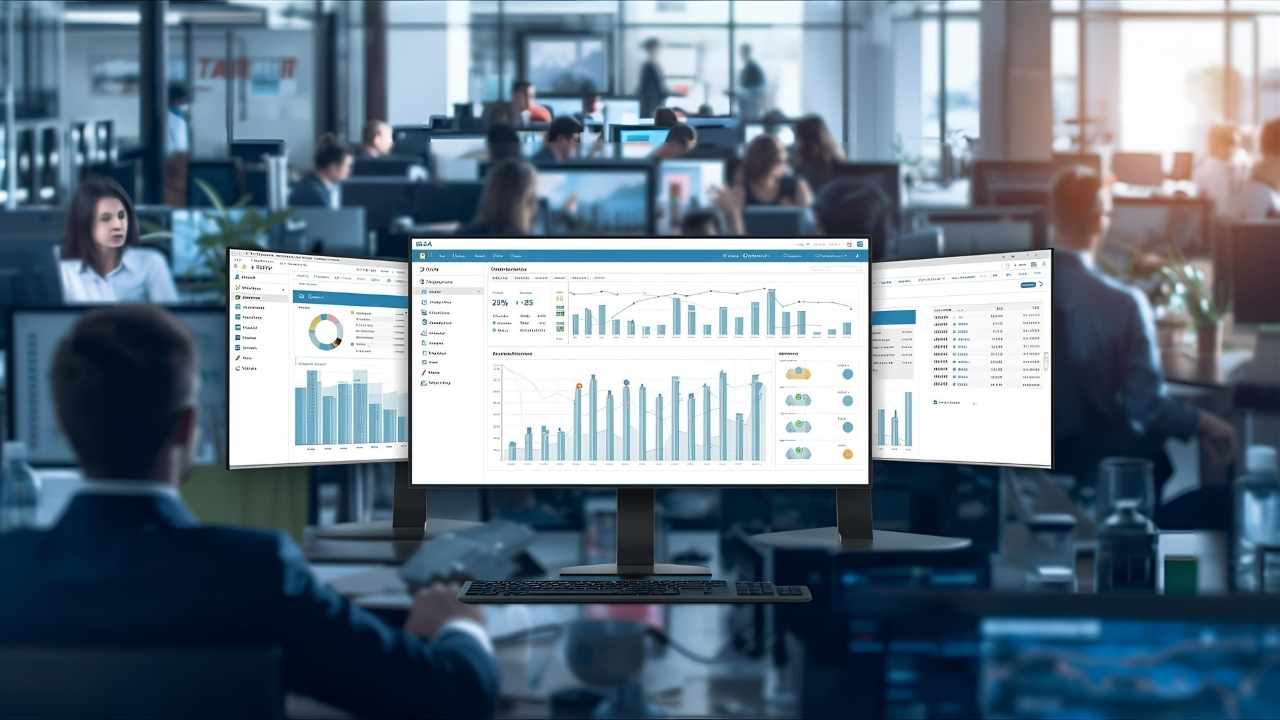The decision to select appropriate accounting software serves as a vital necessity for Chartered Accountants (CAs) and financial professionals who need to efficiently handle their bookkeeping operations, handle tax obligations, perform auditing, and generate financial reports. The 15 top CA accounting software solutions provide automated capabilities with precise financial tracking functionality, which provides instant financial reporting abilities required for business organizations to operate more efficiently and adhere to regulatory standards.
Accountants, together with finance managers, auditors, and business owners, need reliable financial management solutions, which these tools provide. The tools are chosen using fundamental evaluation factors involving simplicity of use along with automated features andsystem integration capabilities while maintaining scalability, security, and conformity with tax legislation. The accounting solutions provide optimization benefits to both small businesses and large enterprises, along with independent practitioners, with enhanced decision-making processes.
Criteria to Select Ideal CA Accounting software
To find the suitable CA accounting software, one must consider multiple factors that promote both accuracy and compliance as well as efficiency. These are the main selecting factors for the best accounting software suitable for chartered accountants:
1. User Friendly: Users must find it easy to understand the software because it presents an accessible and user-friendly interface design through a clean dashboard structure.
2. Automation: The software includes automated functions for bookkeeping alongside invoicing, tax computation, and bank matching, which decrease manual tasks and mistakes.
3. Tax Compliance: Suitable accounting software should support operations in GST and TDS reporting while also handling income tax requirements and national and international tax law compliance tasks.
4. This seamless integration also helps organizations manage accounts and payments more efficiently, emphasizing why understanding open banking basics is important for optimizing financial operations.
5. Security: The financial data gets security through encryption techniques together with multi-factor authentication and cloud-based backup systems that defend against possible breaches.
6. Scalability: The solution needs to show flexibility through different business types and industrial scales and allow users to personalize their reporting structures along with operational work sequences.
7. Support: Customer Support & Training comes with dependable customer assistance alongside training materials and documentation, so onboarding remains straightforward as well, and issues get resolved easily.
8. Multi-user: Cloud-based applications running through user permissions enhance teamwork and protect accounting information integrity during collaborative work.
9. Cost-Effectiveness: The software should deliver monetary worth at reasonable prices that accommodate small businesses and mid-sized companies, together with large corporations.
Accountants and finance professionals can make the most effective software selection by evaluating this set of criteria that match their company’s requirements, increase operational efficiency, and meet regulatory standards.
Comparison Between CA Accounting Software
Here’s a comparison of 15 CA accounting software solutions, focusing on their features, pricing, use cases, and official websites:
| Software | Key Features | Pricing (as of Feb 2025) | Use Cases | Website |
| TallyPrime | Comprehensive accounting, inventory management, GST compliance, payroll, multi-currency support | One-time purchase: ₹22,500 (Silver Edition); Rental options available starting at ₹750 per month | Suitable for small to medium-sized businesses seeking robust accounting and compliance features | tallysolutions.com |
| QuickBooks Online | Invoicing, expense tracking, payroll, tax management, third-party integrations | Subscription plans starting at $17.50 per month | Ideal for small businesses and freelancers needing cloud-based accounting with payroll features | quickbooks.intuit.com |
| Zoho Books | Invoicing, expense tracking, project management, inventory management, bank reconciliation, multi-currency support | Subscription plans starting at ₹899 per month | Best for small to medium-sized businesses looking for an integrated accounting solution | zoho.com/books |
| Xero | Invoicing, bank reconciliation, expense claims, inventory management, payroll, multi-currency support | Subscription plans starting at $2.90 per month for first 3 months | Suitable for small to medium-sized businesses desiring a user-friendly, cloud-based accounting | xero.com |
| FreshBooks | Invoicing, expense tracking, time tracking, project management, estimates, proposals | Subscription plans starting at $7.60 per month | Ideal for freelancers and small businesses focusing on client invoicing and project management | freshbooks.com |
| Wave Accounting | Invoicing, expense tracking, receipt scanning, bank reconciliation, payroll (paid add-on) | Free for core features; $16/monthBilled monthly | Best for freelancers and small businesses seeking a free, user-friendly accounting solution | waveapps.com |
| Sage Business Cloud Accounting | Invoicing, expense tracking, cash flow management, bank reconciliation, inventory management | Get 3 months free, then starting at £15 per month (excluding VAT) | Suitable for small businesses needing scalable accounting solutions with cloud accessibility | sage.com |
| NetSuite ERP | Comprehensive ERP solution including financial management, CRM, e-commerce, inventory, and supply chain management | Pricing available upon request; typically tailored to enterprise needs | Ideal for medium to large enterprises requiring a comprehensive, integrated ERP solution | netsuite.com |
| Busy Accounting Software | Financial accounting, inventory management, GST compliance, payroll, multi-currency support | One-time purchase: Pricing varies based on edition; contact vendor for details | Suitable for small to medium-sized businesses focusing on accounting and inventory management | busy.in |
| Marg ERP | Accounting, inventory management, GST compliance, payroll, manufacturing, distribution management | One-time purchase: Pricing varies based on modules and users; contact vendor for details | Best for businesses in manufacturing, distribution, and retail sectors needing comprehensive ERP | margcompusoft.com |
| Vyapar | Invoicing, expense tracking, inventory management, GST billing, estimates | ₹ 3239.10For one year | Ideal for small businesses and shop owners seeking a simple, affordable accounting solution | vyaparapp.in |
| Saral Accounting | Financial accounting, inventory management, GST compliance, payroll, TDS management | One-time purchase: Pricing varies; contact vendor for details | Suitable for small to medium-sized businesses focusing on accounting and compliance | saralaccounts.com |
| ClearTax | GST filing, income tax filing, invoicing, expense tracking, investment declarations | Free basic version; premium plans available for additional features | Best for individuals and businesses seeking simplified tax filing and compliance solutions | cleartax.in |
| GnuCash | Double-entry accounting, invoicing, expense tracking, investment tracking, multi-currency support | Free and open-source | Ideal for individuals and small businesses looking for a free, open-source accounting solution | gnucash.org |
| MYOB Essentials | Invoicing, expense tracking, payroll, bank reconciliation, GST reporting | Subscription plans starting at $5.50 per month | Suitable for small businesses in Australia and New Zealand needing comprehensive accounting | myob.com |
List of 15 Best CA Accounting Software
1. TallyPrime
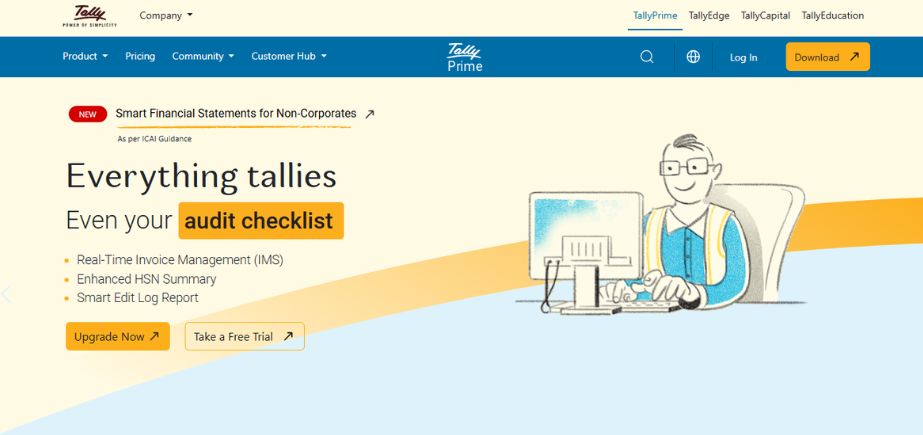
TallyPrime is popular business management software for small and medium enterprises (SMEs). It includes accounting, inventory management, taxation (GST), payroll, and financial reporting capabilities. Easy to use and effective, TallyPrime allows automation of processes and compliance. It provides offline access for the safety of data, and it has a simple user interface for non-accountants. It supports multiple users and connects with various financial tools
Key Features:
- GST compliance and filing
- Inventory and payroll management
- Multi-currency support
- Bank reconciliation
- Customizable reporting
Pros:
- Widely used and recognized in India
- Robust GST and compliance features
- Easy to use for accountants
Cons:
- Lacks cloud accessibility
- Dated user interface
Pricing:
One-time purchase: ₹22,500 (Silver Edition); Rental options available starting at ₹750 per month
Who Should Use It?
Ideal for Indian businesses,it is an ideal accounting software for CA firm, and SMEs needing GST compliance.
2. QuickBooks Online
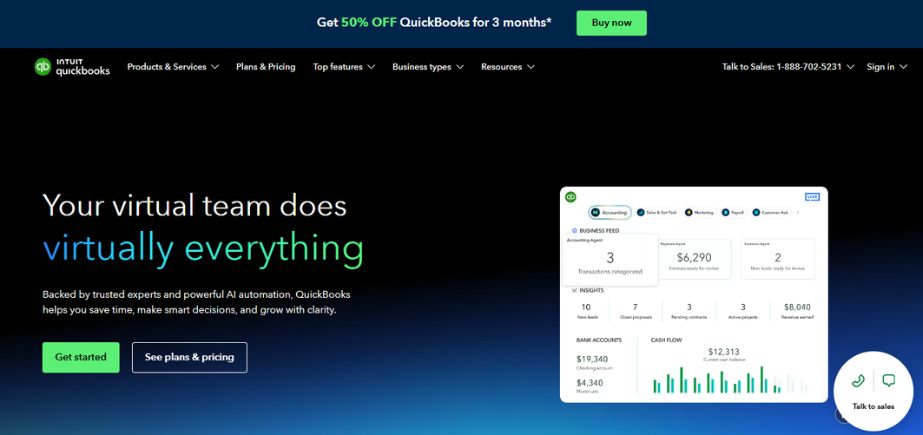
Intuit’s QuickBooks Online is cloud accounting software that is built for small businesses. It helps people to handle invoices, track expenses, do bank account reconciliations, and generate financial statements. With multi-user features and automated tax calculations, it simplifies bookkeeping. It is integrated with most third-party programs and offers mobile access, so it is a productive choice for entrepreneurs who prefer flexible and expandable accounting programs.
Key Features:
- Cloud-based access
- Automated invoicing and expense tracking
- Multi-user collaboration
- GST and tax calculations
- Bank reconciliation
Pros:
- Easy to use
- Scalable for different business sizes
- Strong integrations
Cons:
- Expensive for larger teams
- Limited offline capabilities
Pricing:
Starts at $17.50/month
Who Should Use It?
Small businesses, accountants, and freelancers looking for cloud-based solutions.
3. Zoho Books
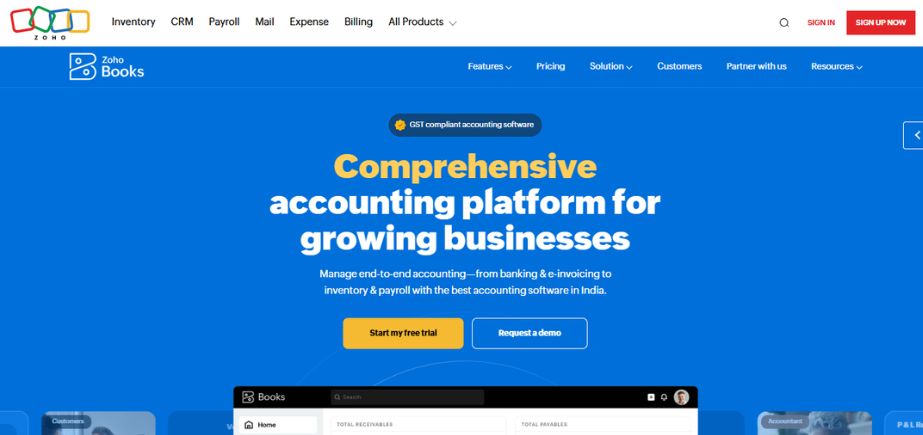
Zoho Books is a cloud-based accounting application suitable for small and medium enterprises. It supports features like invoicing, expense tracking, bank reconciliation, tax compliance (including GST), and financial reporting. Zoho Books integrates seamlessly with other Zoho applications and third-party software, making it a very versatile tool. Its user-friendly interface, automation capabilities, and mobility make accounting tasks simpler while ensuring compliance with local financial regulations.
Key Features:
- GST compliance
- Automated workflows
- Client and vendor management
- Multi-user access
- Mobile-friendly
Pros:
- Affordable pricing
- Strong automation and integrations
- Excellent customer support
Cons:
- Limited third-party app support
- Not ideal for large enterprises
Pricing:
Starts at ₹899/month
Who Should Use It?
SMEs, freelancers, and CAs needing automation and compliance tools.
4. Xero
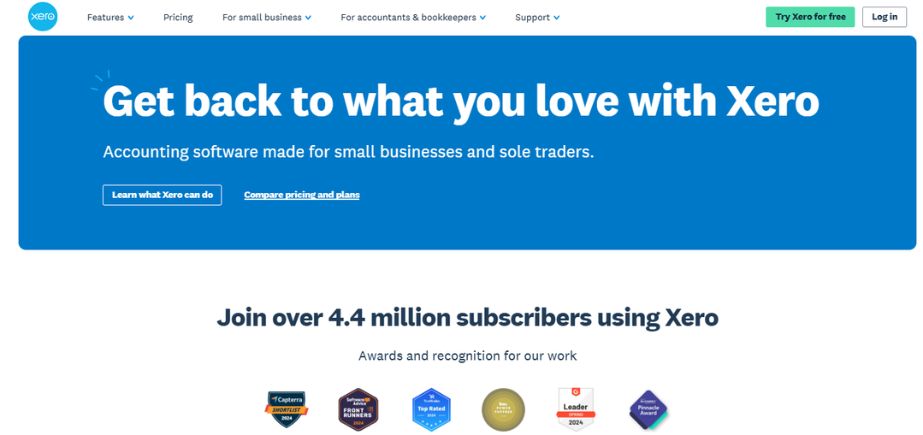
Xero is a web-based CA accounting software most appropriate for small and medium-sized businesses. Its features include bank reconciliation, invoicing, expense tracking, payroll, and financial reporting. Xero allows real-time collaboration and multi-user functionality with enhanced efficiency and decision-making. Its integration with a huge number of third-party apps, strong security features, and support for mobile devices make it an efficient solution for companies seeking simple-to-use, automated, and scalable accounting.
Key Features:
- Cloud-based accounting
- Automated bank feeds
- Expense tracking
- Multi-currency support
- Third-party integrations
Pros:
- User-friendly interface
- Strong automation tools
- Good for accountants and small businesses
Cons:
- Learning curve for new users
- Limited customer support
Pricing:
Starts at $2.90/month for first 3 months
Who Should Use It?
Small to mid-sized businesses, accountants, and consultants.
5. FreshBooks
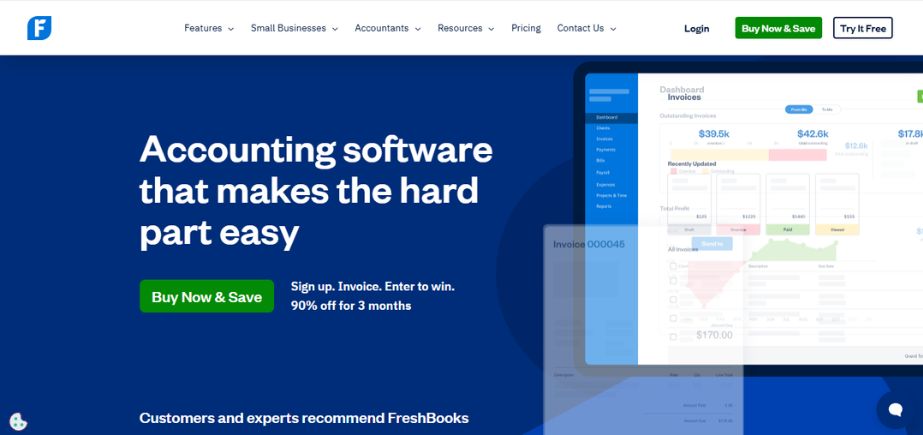
FreshBooks is a cloud-based accounting tool that is simple to use for freelancers and small businesses. It provides features like invoicing, time tracking, expense management, and financial reporting. FreshBooks makes it easy to calculate taxes and has online payment capabilities through integrations with various payment gateways. Its simplicity of use, automation capabilities, and mobile accessibility make it a great option for service professionals who can manage their finances effectively.
Key Features:
- Automated invoicing and payments
- Time tracking and project management
- Multi-currency transactions
- Customizable reporting
Pros:
- Intuitive interface
- Strong invoicing features
- Great customer support
Cons:
- Limited inventory management
- Expensive for large businesses
Pricing:
Starts at $7.60/month
Who Should Use It?
Freelancers, small business owners, and consultants.
6. Wave Accounting
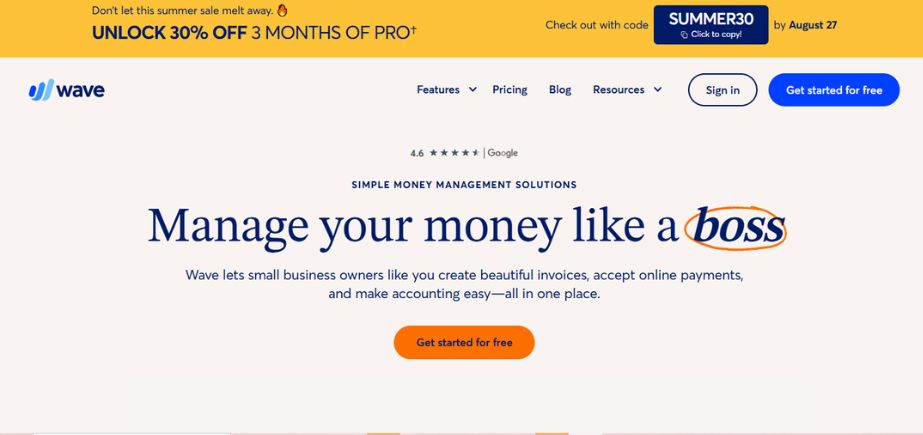
Wave Accounting is a cloud-based, free accounting software that is suitable for small businesses, freelancers, and startups. It offers invoicing, expense tracking, bank reconciliation, and financial reporting. Although basic accounting features are offered for free, other services such as payroll and payment processing incur a fee. Wave’s easy-to-use interface and automation feature make it a perfect choice for entrepreneurs who need affordable accounting tools without sacrificing basic features.
Key Features:
- Free CA accounting software
- Expense tracking
- Invoicing and payment processing
- Payroll management (paid feature)
Pros:
- Free for basic features
- Easy to use
- Good for startups
Cons:
- Limited features compared to paid tools
- No direct customer support
Pricing:
Starting at $16/month
Who Should Use It?
Freelancers, startups, and micro-businesses.
7. Sage Business Cloud Accounting
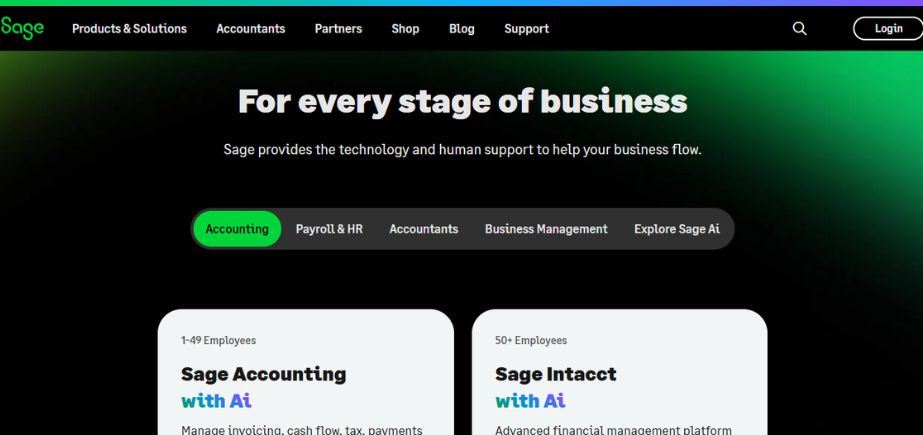
Sage Business Cloud Accounting is accounting software with cloud-based technology for small and expanding businesses. Sage provides invoicing, expense management, tax calculations, managing cash flow, and financial reporting. It automates and makes it accessible to multiple users to simplify accounting tasks while maintaining compliance. Sage can integrate third-party applications and be accessed via mobile devices, making it a strong option for scalable financial management solutions for businesses.
Key Features:
- Cloud-based accounting
- VAT and tax compliance
- Automated bank reconciliation
- Multi-user access
Pros:
- Scalable for different business sizes
- Strong automation features
Cons:
- Expensive for small businesses
- Requires training for full use
Pricing:
Starts at £15/month
Who Should Use It?
Medium-sized businesses and accounting firms.
8. NetSuite ERP
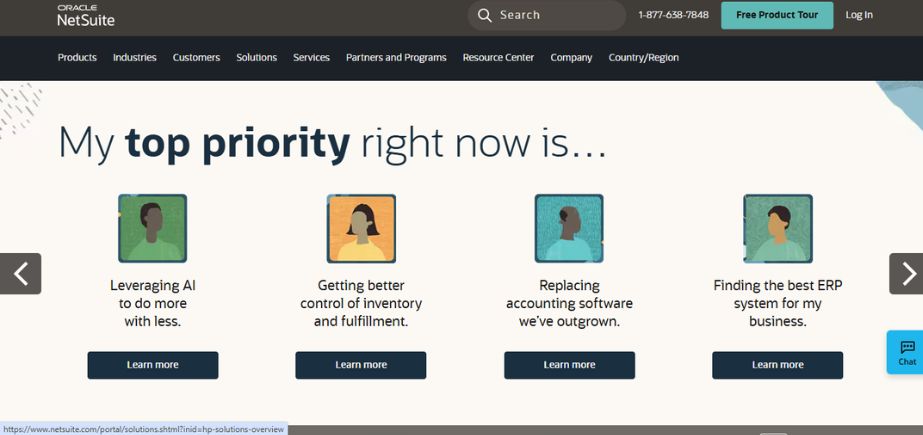
Oracle NetSuite ERP is a full-featured cloud-based enterprise resource planning (ERP) platform. It provides sophisticated financial management, inventory management, order management, procurement, and tax compliance. It is suitable for medium to large-sized firms and delivers real-time business insight, automation, and scalability. NetSuite’s integration features with CRM, e-commerce, and HR applications make it a robust solution for organizations looking for an integrated and data-driven business management system.
Key Features:
- Advanced financial reporting
- Global tax compliance
- Multi-company accounting
- Strong integration options
Pros:
- Scalable for enterprises
- Comprehensive financial tools
Cons:
- Expensive for small businesses
- Complex setup
Pricing:
Custom pricing
Who Should Use It?
Large businesses and enterprises.
9. Busy Accounting Software
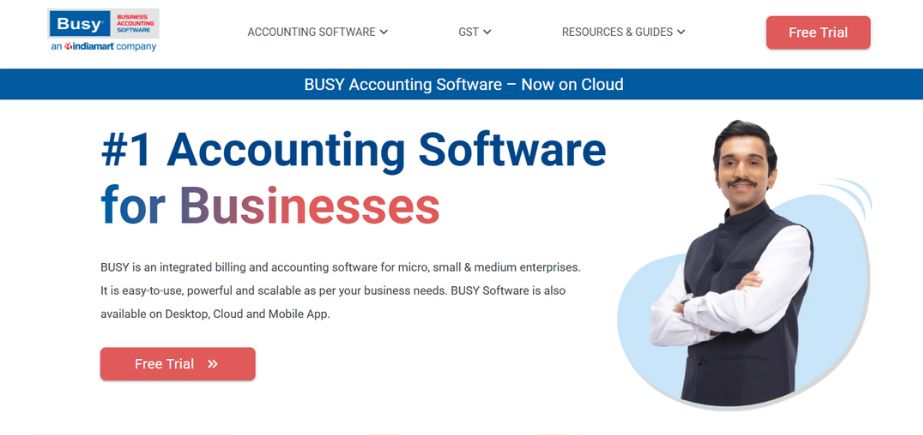
Busy Accounting Software is business and accounting management software for small and medium-sized businesses (SMEs). It provides functionality such as GST compliance, inventory management, invoicing, and financial reporting. Busy is most sought after in India due to its simplicity, multi-currency capabilities, and strong taxation functionalities. Its cost-effectiveness and offline capabilities make it a sought-after option for businesses seeking stable accounting solutions.
Key Features:
- GST filing
- Multi-location inventory
- Payroll processing
- Financial reporting
Pros:
- Affordable
- Strong GST compliance
Cons:
- Outdated UI
- No cloud access
Pricing:
custom pricing
Who Should Use It?
Indian SMEs and accountants.
10. Marg ERP
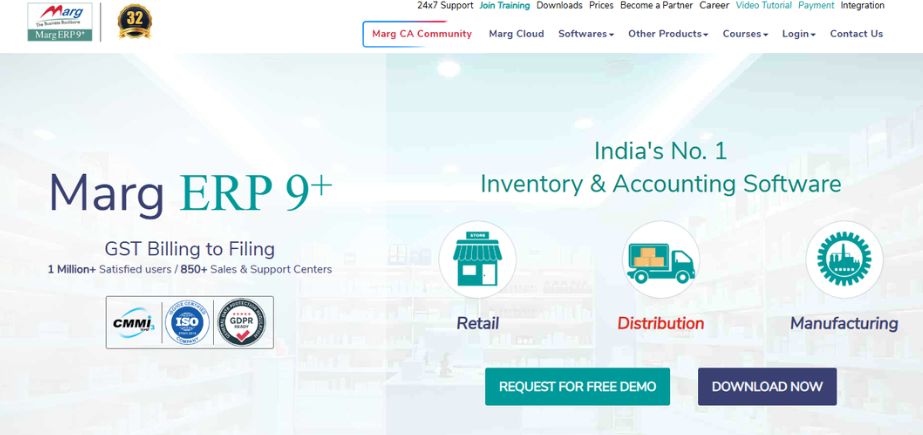
Marg ERP is a software for enterprise resource planning suitable for retail, distribution, and manufacturing businesses. It offers accounting, inventory control, GST compliance, payroll, and billing features. Marg ERP is recognized for its industry-specific configuration, automation, and user-friendliness. It has support for multi-location businesses and integrates with payment gateways, thus being an all-in-one solution for operational efficiency-seeking businesses.
Key Features:
- GST filing
- Barcode scanning
- eCommerce integrations
Pros:
- Affordable
- Strong inventory features
Cons:
- Requires training
- Limited support
Pricing:
custom pricing
Who Should Use It?
Retailers, wholesalers, and accountants.
11. Vyapar
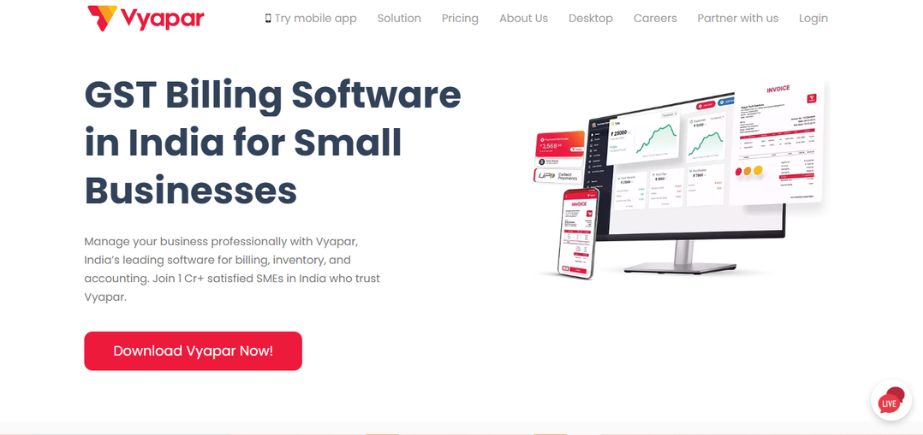
Vyapar is a light accounting and billing software for small businesses, traders, and retailers. It has the functionality of invoicing, expense tracking, inventory management, and GST compliance. The software is capable of both online and offline work, which makes it easy for entrepreneurs. Vyapar is extremely easy to operate, which makes it the ideal option for those who desire an easy and efficient financial management system without any in-depth knowledge of accounting.
Key Features:
- GST invoicing
- Expense tracking
- Inventory management
Pros:
- Free for basic use
- Mobile-friendly
Cons:
- Limited integrations
- No payroll management
Pricing:
Free, Paid starts at ₹3239.10/year
Who Should Use It?
Small businesses and freelancers.
12. Saral Accounting
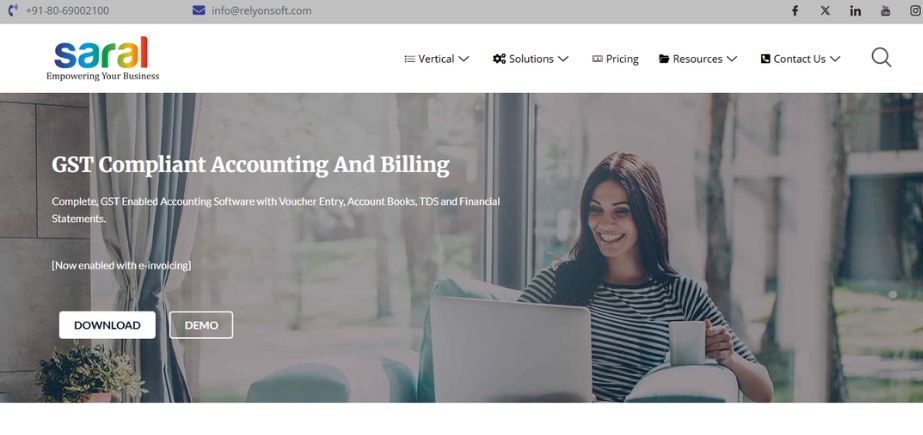
Saral Accounting is an Indian business accounting and GST software that streamlines invoicing, tax filing, inventory, and financial reporting. With Saral’s easy-to-use interface and automated features, businesses can automate their accounting process. Being compliance-centric, it is ideal for professionals and SMEs who are searching for a low-cost, simple solution for managing taxes and accounts.
Key Features:
- GST and VAT filing
- Payroll management
- Automated calculations
Pros:
- Easy GST filing
- Affordable
Cons:
- Not cloud-based
- Dated UI
Pricing:
Custom pricing
Who Should Use It?
Indian businesses and accountants.
13. ClearTax
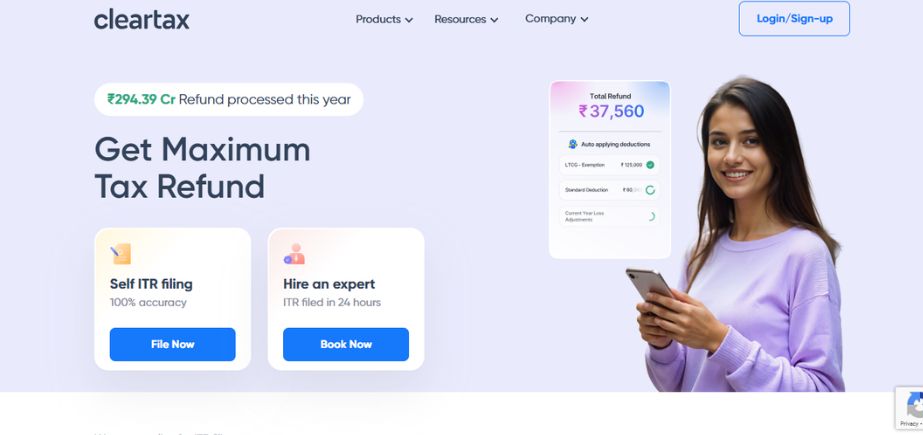
ClearTax is a tax compliance and accounting platform for businesses, professionals, and individuals in India. It provides GST filing, invoicing, tax planning, and accounting services. With auto-calculations and ease of integration with government portals, ClearTax makes tax compliance easy. It is used extensively by SMEs, accountants, and tax professionals due to its accuracy and efficiency in managing financial documents and compliance procedures.
Key Features:
- GST and tax compliance
- Automated filings
- Multi-business support
Pros:
- Strong tax tools
- Cloud-based
Cons:
- Limited accounting features
Pricing:
custom pricing
Who Should Use It?
Indian businesses and CAs.
14. GnuCash
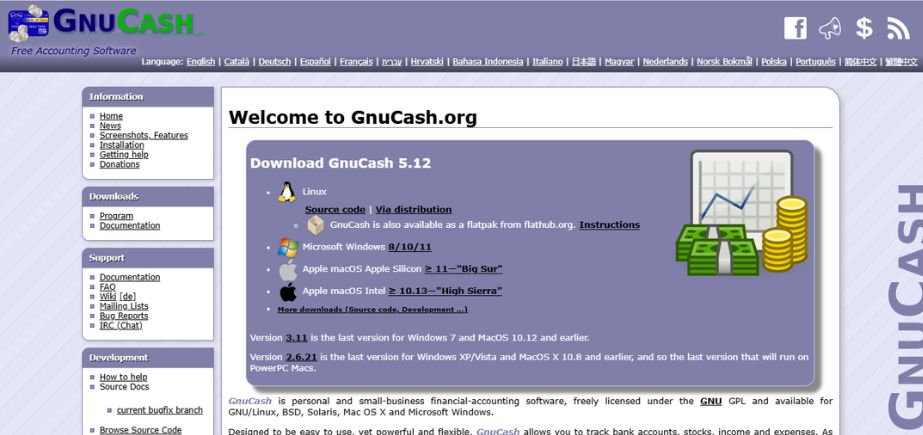
GnuCash is free, open-source accounting software that is appropriate for individuals and small businesses. It has functionalities such as double-entry bookkeeping, invoicing, expense tracking, investment tracking, and financial reporting. GnuCash handles multiple currencies and is compatible with Windows, macOS, and Linux. Although it does not have cloud capabilities, its strong accounting features make it an excellent option for users who want a free, offline, and feature-filled accounting application.
Key Features:
- Double-entry bookkeeping
- Expense tracking
- Multi-currency support
Pros:
- Free to use
- Customizable
Cons:
- Dated interface
- No cloud support
Pricing:
custom pricing
Who Should Use It?
Nonprofits, freelancers, and accountants.
15. MYOB Essentials
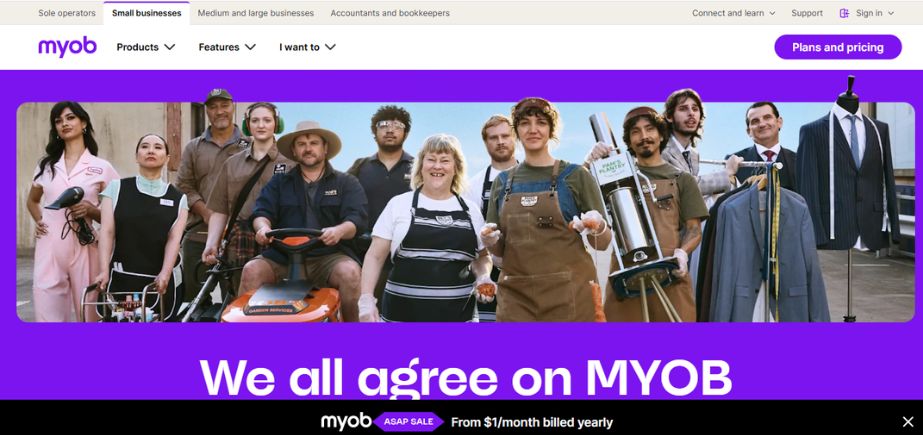
MYOB Essentials is online accounting software developed for small Australian and New Zealand businesses. It offers invoicing, expense management, payroll, and tax compliance tools. MYOB makes business accounting easy with automated bank feeds, financial reporting, and real-time collaboration. MYOB has the ability to integrate with various third-party tools, making it a trusted solution for businesses that need an easy-to-use and compliant financial management solution.
Key Features:
- Cloud-based accounting
- Payroll management
- Bank reconciliation
Pros:
- Strong payroll features
- User-friendly
Cons:
- Expensive for small businesses
Pricing:
Starts at $5.50/month
Who Should Use It?
Australian businesses and CAs.
Conclusion
A user must analyze their needs to pick the ideal CA accounting software. The Indian market would find TallyPrime to be an excellent option because it provides comprehensive GST compliance and an easy user experience. Three leading cloud solutions for small to medium companies are QuickBooks Online, Zoho Books and Xero which provide automated features combined with flexibility and smooth integration capabilities. FreshBooks offers basic features for freelancers and service-based professionals and Wave Accounting presents itself as a valuable no-cost choice for starting businesses.
Advanced financial management needs of larger enterprises can be addressed through NetSuite ERP because it delivers extensive automation capabilities along with advanced reporting features. Sage Business Cloud Accounting is suitable for businesses that grow because it supports multiple currencies. Indian companies seeking GST compliance as well as inventory management solutions can find affordable choices in Busy Accounting Software together with Marg ERP and Vyapar. Tax professionals should opt for Saral Accounting or ClearTax because both platforms specialize in tax filing and compliance services. Open-source enthusiasts can use GnuCash for their personal and small-business accounting requirements along with MYOB Essentials representing a dependable solution for Australian enterprises.
Businesses running on limited accounting expertise will find friendly interfaces in Vyapar and Wave Accounting. NetSuite ERP serves as the best solution for enterprises that require extensive customization. Indian businesses consisting of retailers and distributors use Marg ERP and Busy Accounting Software for CA and self-employed professionals prefer using FreshBooks or Zoho Books because of their needs.
FAQs
1. What are the most common features of CA accounting software?
The common features of CA accounting software are bookkeeping, tax management, financial reporting, audit support, compliance tracking, invoicing, and GST filing.
2. What is the ideal accounting software for CAs?
Normal choices are Tally Prime, QuickBooks, Zoho Books, Busy Accounting, and Marg ERP based on business requirements and regulatory demands.
3. Is CA accounting software cloud-based?
Most modern accounting software packages like Zoho Books and QuickBooks offer cloud access for remote collaboration and working.
4. Can CA accounting software handle GST compliance?
Yes, most accounting applications used by CAs do provide GST calculation, return filing, and e-invoicing functionality to simplify tax compliance.
5. Is accounting software secure for financial data?
Reliable accounting software provides encryption, multi-factor authentication, and auto-backup facilities to protect data and prevent unauthorized access.
